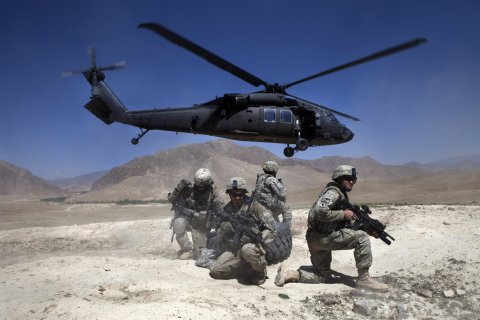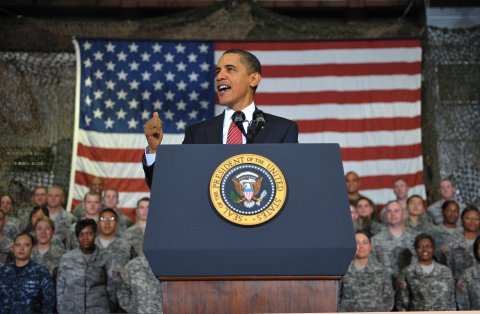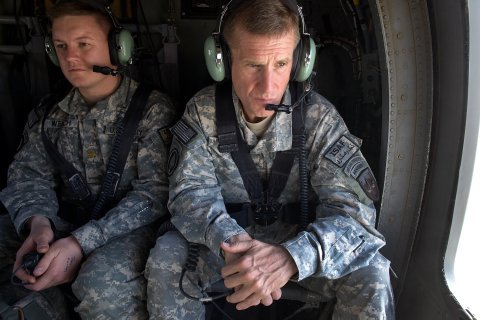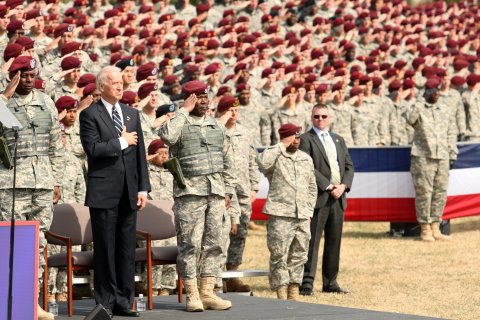When President Joe Biden took office in January 2021, he inherited former President Donald Trump's plan for the withdrawal of troops from Afghanistan. The two men agree on little. Yet, Biden honored the agreement. In fact, Biden has supported reducing troops on the ground for years, advising President Barack Obama to limit involvement there back in 2009, even as Obama's generals were recommending an increased American presence, as discussed in this excerpt from award-winning, former BBC journalist David Loyn's new book, The Long War: The Inside Story of America and Afghanistan since 9/11 (St. Martin's Press, September 21). In the wake of the U.S.' unilateral withdrawal from Afghanistan and the country's swift fall to the Taliban, Loyn and his work offer an insight into Biden's policy in the region and into some of the decisions that were made while he was vice president to a new president with little foreign policy experience.

In the "Yes, we can!" optimism of the change of power in Washington, D.C. in January 2009, a profound rethinking of "Bush's wars" was one of the top priorities. Afghanistan was no longer the "other war" but the "good war," Iraq the unnecessary "war of choice." While both wars were to be ended, the administration was not united on how that should be done.
Obama hedged between values and interests in foreign policy, idealist promotion of democracy against realist focus only on U.S. economic and security concerns. He made a speech in Cairo promising a "New Beginning," but he was wary of deeper involvement. Counterinsurgency was fashionable, but few in the administration were committed to the number of troops that would be needed to make it work. The leading realist, Vice President Joe Biden, argued that America should not throw any more money or lives into the maw of Afghanistan other than the bare minimum in adopting counterterrorist tactics (CT), pursuing the remnants of Al-Qaeda with drones and Special Forces.

Far older than most in the administration, Biden was first elected to the Senate in 1972, aged just 30, when he ran on an anti-Vietnam war platform. He had been on the other side of the argument from the soldiers who had joined up then and were now the generals commanding America's wars. In Afghanistan his stripped-down counterterrorist plan was derided by many in the Army as unworkable. "To defeat a network, you have to attack the network," said General David McKiernan, then the commander of troops in Afghanistan.
It is a well-tested military maxim that to win, insurgents need only outlast the will of those fighting them—contained in the much-quoted line said to be used by the Taliban, "You may have a watch, but we have the time." Unlike conventional armies, insurgents can face tactical defeats, losing every battle, and still prevail if they have enough support from the population. Counterterrorist tactics alone would not deliver the minimum result required of the campaign—that it prevented Afghanistan again becoming a haven for people planning attacks on the homeland. This was the Afghan dilemma the Obama administration never resolved.
By 2009, the counterinsurgency doctrine developed by Generals David Petraeus and Jim Mattis in 2006 was more widely accepted across the U.S. military. It was known by the acronym COIN, and McKiernan was employing it in Afghanistan.
"The war in Afghanistan is such that you have to use counterinsurgency ways and means to achieve your ends. At the same time, you have to use counterterrorist ways and means to defeat terrorist networks that operate in the region...you have to do both." Fighting, training local troops, and building up the Afghan government, were all parts of a virtuous circle, where security would sustain better governance, building a stable economy to provide jobs, to make it easier to encourage those insurgents not deterred by tough military action to lay down their weapons.
That was the theory at least. But a properly-resourced counterinsurgency would take more time and more money than the Obama administration was prepared to commit. And Biden's minimalist approach had significant traction in Obama's support base inside and outside Congress, who feared being sucked further in. It cost $1 million a year to keep a soldier in Afghanistan. In the year of global financial meltdown, spending more on the long war was a hard sell.
It was still no clearer what winning meant. At the beginning, President George W. Bush sent troops to Afghanistan in 2001 "to destroy the Taliban and Al-Qaeda," before drifting into an ill-formed dream of building democracy. The language of President Obama's first speech on the war in March 2009 signaled narrower aims: "To disrupt, dismantle and defeat Al-Qaeda in Pakistan and Afghanistan and to prevent their return to either country in the future." But neither president was willing to commit to the long-term stability that would indeed "prevent their return."
The paradox of not wanting to commit to nation-building, but only short-term fixes, was what condemned America to be in Afghanistan for the long term. During the arguments in 2009 over troop increases requested by the Afghan commander who replaced McKiernan, General Stanley McChrystal, the president was clear. "I'm not doing 10 years. I'm not doing a long-term nation-building effort." As a consequence, America would indeed be in Afghanistan for another 10 years, spending many billions of dollars, still without a plan for anything other than the short term.

The pity was that rethinking the war in 2009 was supposed to be different—making judgments based on more than the numbers of boots on the ground, the only metric that ever seemed to matter. But it did not turn out that way because of the narrow aperture of the war aim, as if looking down the wrong end of a telescope. If the only target was Al-Qaeda, the administration would not commit to a whole of Afghanistan policy including security, long-term programs for governance, infrastructure, land reform, justice, higher education, a road map for talking to the Taliban and a coherent approach to the continued threat played by the non-Taliban warlords.
Obama saw the decision he had to make as consequential as LBJ being asked to send ground troops to Vietnam in 1965. Across the administration they were reading Lessons in Disaster, a book just out about national security aide McGeorge Bundy's missteps in pushing for more troops in 1965. Obama's team was determined to learn from Lesson Five—"Never Deploy Military Means in Pursuit of Indeterminate Ends."
It was unclear what the ends were. McChrystal regretted not pushing Obama to give him clearer guidance when he was appointed to replace McKiernan. "I should have given him a piece of paper and said, write down what you want me to do, and I will try to do that. It would have forced him to get in his own mind what he wanted me to do, and me to understand it."
On arrival in Kabul in June 2009, McChrystal was asked for his strategic assessment. Over the next few months, the White House felt boxed in by generals going public with demands for more troops. At the beginning of September, Centcom commander General Petraeus called The Washington Post to rebut a column saying counterinsurgency would fail in Afghanistan. Far from it, said Petraeus. More troops were needed for a fully-resourced counterinsurgency. "We have to get ahead of this, to arrest the downward spiral, to revive momentum."
Afghan experts and think tankers brought to Kabul to inform McChrystal's Strategic Assessment wrote op-eds on their return saying more force was needed, with bylines associating them to McChrystal. Having his staff contact them to lay off was just locking the stable door. To the White House it looked like a coordinated campaign. Biden called it "f*cking outrageous."

What were troops there to do? "Disrupt, dismantle and defeat Al-Qaeda" was what Obama said in his March speech. At Defense Secretary Robert Gates' insistence, the Strategic Implementation Plan, effectively the orders given to McChrystal, had stronger language. The enemy who should be defeated was not just Al-Qaeda, but also the Taliban. "Defeat" is defined by the U.S. Army as "rendering a force incapable of achieving its objectives." It may not involve any military action at all, if the political environment could be altered. Defeating the Taliban meant denying them space to operate, so to McChrystal the campaign "necessarily included building capacity across the government and providing the opportunity for economic development." It set alarm bells ringing as it sounded like nation-building.
The word counterinsurgency was not used in the president's March speech; he took it out of the National Security Council draft. But it was at the heart of McChrystal's September strategic assessment document. "We must conduct classic counterinsurgency operations in an environment that is uniquely complex," McChrystal wrote. "Success demands a comprehensive counterinsurgency (COIN) campaign." Like so much, the assessment leaked. The people could read it in The Washington Post before McChrystal had briefed it to senior military commanders—four columns under the headline "McChrystal: 'More Forces or Mission Failure.'" McChrystal knew the shock effect of what he was writing. In the military it's cool to understate, and say things are fine. This was not going to be an understated report; its conclusions were deliberately stark. "Failure to gain the initiative and reverse insurgent momentum in the near term...risks an outcome where defeating the insurgency is no longer possible." While there were no troop requests in the document, McChrystal wrote "inadequate resources will likely result in failure."
About two weeks later, in answers to questions after a speech at a London defense think tank, the International Institute for Strategic Studies, McChrystal was asked if he would support counterterrorism alone, the Biden option, although Biden was not mentioned by name. He said "The short answer is no." Reducing the mission to drone attacks and airstrikes would lead to "Chaos-istan."

Excerpt adapted from The Long War: The Inside Story of America and Afghanistan Since 9/11 by David Loyn, published by St. Martin's Press.
"general" - Google News
September 01, 2021 at 05:00PM
https://ift.tt/2WBBAnw
Biden Called Press Leaks by General McChrystal in Afghanistan 'F*cking Outrageous' Says New Book - Newsweek
"general" - Google News
https://ift.tt/2YopsF9
https://ift.tt/3faOei7
Bagikan Berita Ini














0 Response to "Biden Called Press Leaks by General McChrystal in Afghanistan 'F*cking Outrageous' Says New Book - Newsweek"
Post a Comment